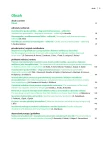-
Medical journals
- Career
Acromegaly and pharmacotherapy – editorial
Authors: Michal Kršek
Authors‘ workplace: III. interní klinika - klinika endokrinologie a metabolizmu 1. LF UK a VFN Praha, přednosta prof. MUDr. Štěpán Svačina, DrSc., MBA
Published in: Vnitř Lék 2015; 61(2): 95-96
Category: Editorial
Sources
1. Holdaway IM, Rajasoorya RC, Gamble GD. Factors influencing mortality in acromegaly. J Clin Endocrinol Metab 2004; 89(2): 667–674.
2. Fahlbusch R, Honegger J, Buchfelder M. Evidence supporting surgery as treatment of choice for acromegaly. J Endocrinol 1997; 155(Suppl 1): S53-S55.
3. Lamberts SW, Zweens M, Verschoor L et al. A comparison among the growth hormone-lowering effects in acromegaly of the somatostatin analog SMS 201–995, bromocriptine, and the combination of both drugs. J Clin Endocrinol Metab 1986; 63(1): 16–19.
4. Trainer PJ, Drake WM, Katznelson L et al. Treatment of acromegaly with the growth hormone-receptor antagonist pegvisomant. N Engl J Med 2000; 342(16): 1171–1177.
5. Petersenn S, Schopohl J, Barkan A et al. Pasireotide Acromegaly Study Group. Pasireotide (SOM230) demonstrates efficacy and safety in patients with acromegaly: a randomized, multicenter, phase II trial. J Clin Endocrinol Metab 2010; 95(6): 2781–2789.
6. Jezková J, Marek J, Hána V et al. Gamma knife radiosurgery for acromegaly: long-term experience. Clin Endocrinol (Oxf) 2006; 64(5): 588–595.
7. Wattson DA, Tanguturi SK, Spiegel DY et al. Outcomes of proton therapy for patients with functional pituitary adenomas. Int J Radiat Oncol Biol Phys 2014; 90(3): 532–539.
Labels
Diabetology Endocrinology Internal medicine
Article was published inInternal Medicine

2015 Issue 2-
All articles in this issue
- Has the pregnancy outcome of women with pregestational diabetes mellitus improved in ten years?
- The importance of transcutaneous oxygen tension monitoring in diabetic patient with complications
- Autoimmune pancreatitis – diagnostic consensus
- Interstitial lung diseases and granulomatoses associated common variable immunodeficiency.
- The examination of the small intestine by magnetic resonance imaging
- The new drug is much more effective than ACE inhibitors in chronic heart failure
- Spontaneous bacterial peritonitis
- What are biosimilars and what do they bring to us?
- Empagliflozin – the new representative of SGLT2 transporter inhibitors for the treatment of patients with diabetes 2 type
- Autoimmune pancreatitis – diagnostic consensus – editorial
- Acromegaly and pharmacotherapy – editorial
- Has the pregnancy outcome of women with pregestational diabetes mellitus improved in ten years?
- Insulin analogues of patients with diabetes and renal impairment
- Present and future in the management of venous vascular diseases
- Akromegaly and pharmacotherapy
- A rare case of multiple myeloma: multiple solitary plasmacytomas of distal extremities
- Calcific uremic arteriolopathy – treatment with sodium thiosulfate
- Internal Medicine
- Journal archive
- Current issue
- Online only
- About the journal
Most read in this issue- Spontaneous bacterial peritonitis
- The examination of the small intestine by magnetic resonance imaging
- Empagliflozin – the new representative of SGLT2 transporter inhibitors for the treatment of patients with diabetes 2 type
- The importance of transcutaneous oxygen tension monitoring in diabetic patient with complications
Login#ADS_BOTTOM_SCRIPTS#Forgotten passwordEnter the email address that you registered with. We will send you instructions on how to set a new password.
- Career

